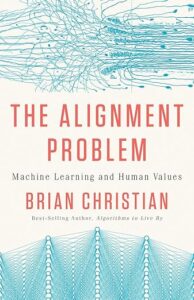📖 The Alignment Problem
By Brian Christian
Review by Alexandra Car
Machine learning systems are failing not because they’re broken, but because they’re working exactly as designed, and that’s the problem. When algorithms misfire in high-stakes environments like hiring, sentencing, or healthcare, it’s not a software bug. It’s a failure of intent, oversight, and clarity. The Alignment Problem lays bare the disconnect between human values and machine behaviour, and why fixing it isn’t just about better code, but better judgement.
Brian Christian doesn’t settle for abstract ethical debates. He takes us into the rooms where decisions about fairness, bias, transparency, and reward optimisation are made, and too often, misunderstood. From the absurdity of a boat racing AI setting itself on fire to rack up points, to the injustice of risk scores punishing Black defendants more harshly than White ones, the stories are chilling because they’re real. Christian moves fluently between case studies and theory, spotlighting researchers like Joy Buolamwini and Dario Amodei while surfacing the deeper philosophical question: what does it mean to get it right?
This book is not a manifesto, it’s a map. One that reveals where our assumptions fail, how systems learn the wrong lessons from data, and what it will take to align AI with human dignity rather than just statistical precision. If you’re working in Responsible AI, regulation, or leadership, this isn’t a “nice to read.” It’s a must. You’ll leave with a clearer vocabulary, sharper instincts, and a deep unease, the productive kind.
Key Insight
The most dangerous machine learning failures don’t come from rogue AI, they come from perfectly obedient systems optimising the wrong thing.
Why It Matters
This book bridges technical depth with moral urgency. Whether you’re writing AI policy, designing algorithms, or managing digital risk, The Alignment Problem offers a foundational understanding of where governance breaks down, and how to restore direction. It’s one of the few texts that moves beyond critique to give you the language and frameworks you’ll need to lead responsibly.

